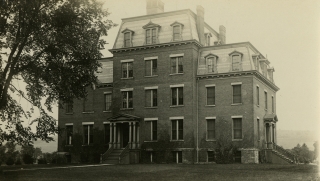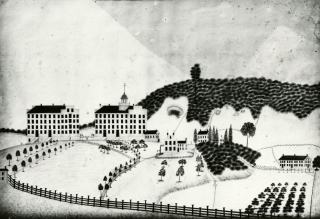To supplant the Cottage Edifice, which the increased enrollment made too small for dining purposes, a new Boarding Hall was built in 1838 under the supervision of Steward Edmunds. It was 95 feet long, 42 feet wide, and two stories high. Its site “on the plain” where the present Huntington Gymnasium now is, was considered to have several advantages: students would get exercise by walking down the Hill for their meals; produce could be brought in easily from the Society’s farm; and access to the village for business purposes would be convenient. The Cottage Edifice was fitted up for classrooms.
Students themselves provided what today would be called janitor service. They not only kept their own rooms in order but also rang the bell for classes and services, swept and lighted the classrooms, and heated them with wood which they themselves sawed and chopped. A sense of cleanliness and neatness does not seem to have restrained some from throwing various objects out of dormitory windows. The faculty and Students Association found it necessary to make regulations prohibiting the practice, the Association even voting a fine of one shilling for throwing out water, especially mop water.
The Board and students took measures for fire protection, but no significant conflagrations occurred. In 1837 the Trustees directed the steward to take out a $10,000 fire insurance policy. Occupants of dormitories were required to furnish themselves with sheet-iron covered pans for carrying live coals to their stoves and were directed not to steal embers from classrooms. Each was supposed to have a pail full of water in his room in the evening before retiring for use in case of emergencies. One December Sunday in 1837 there were two small fires in West Hall. The first started in a chimney during the night, and burned into the ceiling by morning when it was put out. The second happened in the afternoon when most of the students were attending services in the village. When the alarm was given, the congregations in the Baptist,· Congregational, and Episcopal churches immediately broke up and raced for the Hill in sleighs, on horseback and on foot. Before many arrived the blaze, again in a chimney, had been extinguished. Within a few days the Board asked that two bucket brigades and a property-recovering company be formed, but apparently these organizations were short-lived because within a few years new ones were established.
By 1840 the Hamilton Literary and Theological Institution had






